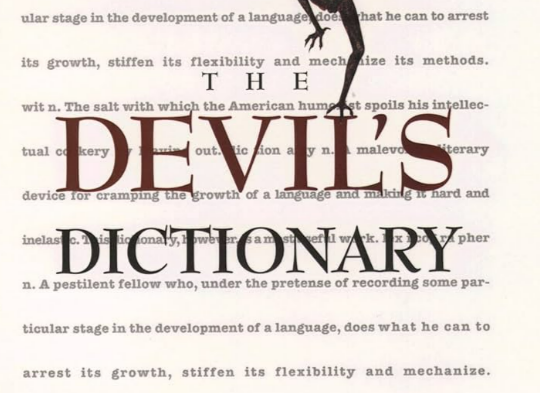Chapter O
byChapter O begins with Bierce’s sardonic take on Oath, described not just as a solemn vow but as an appeal to a deity designed to scare someone into telling the truth. He points out that its real power comes less from divine authority and more from the fear of perjury and punishment. The deeper suggestion is that society often relies on fear rather than integrity to uphold honesty. Bierce’s view strips the ceremonial dignity from the act and leaves behind a mechanism rooted in human insecurity. The oath becomes not a promise, but a performance.
Next is Oblivion, which Bierce frames as the resting place not of all souls, but specifically those who lacked ambition or failed to make a lasting mark. He calls it peaceful, yet ironic, because it swallows both the wicked and the irrelevant without distinction. Fame fades here, along with unfulfilled dreams and forgotten deeds. Rather than tragedy, Bierce treats this erasure with a kind of grim amusement, suggesting that most legacies are temporary illusions. His portrayal invites a reflection on why people chase recognition that won’t outlive them.
The entry for Observatory takes aim at the scientific pursuit of cosmic truth. Bierce mocks astronomers for building conclusions on theories stacked atop untested assumptions. He sees such places not as beacons of knowledge but as temples of educated guessing. The tone is not anti-science but deeply skeptical of its presumed infallibility. His view challenges blind faith in intellectual authority and asks whether modern enlightenment merely replaces one myth with another.
With Obsessed, Bierce highlights how society has long blamed spirits, devils, or invisible forces for extreme behavior. He recounts how once-respected people fell victim to obsessions, often ending in madness or death. The humor lies in how little things have changed—only the names of the afflictions have shifted. What was once possession is now pathology, yet human discomfort with the unknown persists. Bierce’s definition exposes the fear behind the labels we place on behavior we don’t understand.
He defines Obsolete not with pity but with satire, claiming uninspired writers fear old words like they fear original thought. Bierce sees the rejection of dated language as intellectual laziness masked as modernity. True creativity, he argues, doesn’t discard the past—it draws from it. His observation reminds writers and thinkers that originality often blooms from forgotten soil. The word becomes a commentary on progress that forgets its own roots.
In Opportunity, Bierce describes not the optimistic “doorway to success” but a setup for disappointment. He sees it as a gamble, where hope sets the trap and reality provides the fall. This cynical spin suggests that while people celebrate chance, they rarely prepare for failure. Opposition is no better—it’s mocked as a necessary evil in politics, not for its virtue, but to maintain the illusion of balanced power. Bierce presents government as a stage play where conflict is scripted, not sincere.
Optimism receives no mercy. He redefines it as the persistent belief in goodness despite overwhelming evidence to the contrary. It’s not hope, but delusion, protected by selective awareness. Bierce equates it to self-deception dressed in cheer. Meanwhile, Oratory is shown not as art but as manipulation—a method to turn facts into applause. He sees the orator as less a speaker and more a tactician of emotion, shifting crowds with carefully arranged nonsense.
Words like Ovation and Overwork round out Bierce’s critique of modern values. The former is called a diluted echo of its ancient glory, now given for mediocrity rather than excellence. Overwork is labeled a vice disguised as virtue, where self-sacrifice is praised while burnout is ignored. Bierce implies that labor has been twisted into a badge of honor, even when it’s destructive. The idea that exhaustion equals achievement is skewered with biting clarity.
With Owe, he reveals the slippery ethics around debt. The debtor is blamed for irresponsibility, while the creditor is rarely scrutinized for creating conditions that promote dependency. Bierce reframes debt as a moral equation manipulated by profit. His commentary touches on capitalism, showing how fairness is often defined by the powerful. Finally, Oyster closes the chapter with unexpected charm. It’s a creature described more for its culinary fate than its biology, reminding us how human appetite overshadows natural wonder.
In each definition, Bierce weaves sharp humor with deeper truths. He doesn’t simply play with words—he dissects the assumptions behind them. “O” becomes a lens through which readers are invited to reevaluate what they believe about honesty, knowledge, politics, and value. The result is a chapter rich with irony, built to entertain and provoke at once. Through Bierce’s wit, the ordinary becomes a tool for exposing the absurdities of the human condition.

